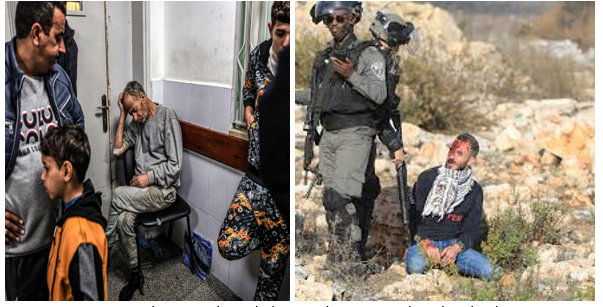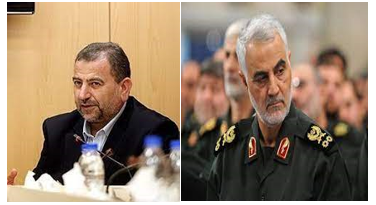In Lebanon, We Wait As We Watch
We hear it in whispers and see it everywhere in screaming headlines. In major crises, public news and the very quiet chatter in the corridors of power rarely agree. But this time, between them, there is hardly any daylight.
The madness of Israel!
The tidbits from those who regularly pace these same corridors are echoing what is unfolding before our eyes in Israel itself. This nation is not well. The state won’t listen, they say. It can’t, it just can’t abide that Hamas, in one well-engineered hit, drove huge holes in the mythical fortress it built. It can’t, it just can’t bear the fact that the sense of invincibility that has allowed it such license flails. As it spills blood with reckless vengeance, it won’t pay heed to the private counsel of the very people shielding it from the world’s censure. It doesn’t want to talk about “the day after” and its consequences. It tortures and taunts and humiliates Palestinian farmers, prisoners, workers, passersby and shares the moments with grotesque gratification on social media platforms. It even trumpets with relish that the intentions and plans behind the slaughter in Gaza aim at ethnic cleansing and genocide, as if goading the international legal community to bring it on.
And the friction between the victimhood Israel claims and the criminality the world condemns is inducing a kind of hysteria among its army of defenders that, at times, borders on the comical.
Israelis are apparently fairing as badly as their government. Polls tell us that a majority of them want to rid the land between the river and the sea from Palestinians; that they want to send Gazans to their grave or into exile. Palestinian Israelis privately confirm what we read in the surveys and Haaretz: they dare not speak Arabic, dare not venture far from the neighborhood, dare not mention Gaza, dare not identify as a Palestinian (instead of Arab) Israeli… Mobs mobilize against Israeli Jews who protest the bloodshed in the strip or support humanitarian aid into it. People are getting fired, kicked around, spat on, hounded out of their homes. Politicians, pundits, and analysts compete in their demands for mass killings of Gazans, making sure to graphically share how they would like it to be done.

Historian Moshe Zimmerman, an expert on Germany, has officially bestowed the sobriquet on his country: Israel has gone mad. It just so happens, he is in the middle of researching this very topic: “How nations deviate from their course and become extreme.” For him,
Israel went mad starting in 1967 when the idea of biblical territory began to dominate it politically. Romanticism is a dangerous tendency, as we saw in 19th-century Europe. The story of ‘Greater Israel’ and the settlements is the story of a society that is becoming a hostage to biblical romanticism that is sweeping the whole society to perdition. And that is the problem: Once you have embarked on the path, it’s difficult to leave it without undergoing another catastrophe. That happened to Germany in 1945 in the most drastic way.

“Paranoids from a master race,” he calls his youthful messianic countrymen, and, indeed, what self-described master race doesn’t breed a profusion of those and eventually hands them the keys. It was therefore preordained that Israel, biblically enraptured and ruling “over another people by an apartheid-like, racist system,” would soon be ruled by a “Kakistocracy,” a cabal of the worst of its children.
And so, we, in Lebanon, watch the madness playout in Gaza, inside the Green Line, in the West Bank and East Jerusalem. We see it play out inside the Israeli cabinet, inside the Israel Defense Forces (IDF), among settlers.
And we wait.
We wait because Israel is just that predictable in its paranoia, its arrogance, its viciousness–and its madness. Because we know that it has to, just has to, show that it remains impregnable, that its Iron Wall is repairable, that it is still master of its destiny and everyone else’s who inconveniently shares its universe.
There is a kind of madness in this thinking. Israel perhaps imagines it might achieve against Hezbollah what it has yet to achieve against Hamas in spite of the wholesale devastation it has unleashed against Gaza and its people. Or it imagines there is strategic merit in a full-scale war with a force much more lethal than Hamas, when Israelis themselves feel unusually exposed and continue to reel from the trauma of October 7 and its fallouts. Or it imagines that a regional conflagration that pulls in Iran and the US would give it the cover it needs to rearrange a geopolitical map it no longer likes.
But then there was always madness in the Jewish state’s thinking that flatlining Arab regimes would simply flatline resistance to its century-long torment of the Palestinians; that it would somehow attain normalcy when, paradoxically, it exalts in its abnormality.
I heard through the grapevine that when French envoys joined us recently in Lebanon to warn of the hell that would descend upon us in the event of a conflict with Israel, they were shocked at how blithely we received the threats. I am not sure why it didn’t occur to these messengers of death that doom is a Lebanese specialty. It’s akin to a generational bequeathment, each time ever greater in the tragedies it leaves like wretched tokens of past sins. It’s not that we don’t have fear, but that we have learned how to make peace with it.
And the truth is that even many of us who are extremely dissatisfied with Hezbollah’s performance in our sectarian kleptocracy are more than impressed with the deterrence it managed to build against Israel. In this sense, we are excellent parsers of our predicaments. We know very well the destruction Israel is capable of inflicting on us, but we know too the carnage Hezbollah can cause in return.
When Israel readied to respond to Hamas’s October 7 assault, many Lebanese predicted that Hezbollah would be enmeshed in a full-fledged war, either because it wanted to or had to. I speculated otherwise. Hamas’s success was in many ways the Lebanese movement’s. The arrival of American aircraft carriers to the shores of the Mediterranean to deter an attack on Israel, ironically, only added to the shine of the resistance, which till this very day is content to calibrate its low-grade tit-for-tat against an increasingly aggressive IDF.

The toll on Hezbollah and the south has grown heavier, to be sure. The assassination of Iranian Revolutionary Guard general Sayyed Razi Mousavi in Syria last week and Hamas’s Saleh al-Arouri last Tuesday in Beirut’s Southern Suburbs mean to convey more than the Jewish state’s intelligence and military prowess, they are invitations to the regional fight it wants. The explosions on Wednesday in Iran near the tomb of General Qassem Suleimani, who was assassinated by the US in 2020, could well be the Mossad’s handiwork, notwithstanding the Islamic State’s claim of responsibility. The timing and symbolism are uncanny, and Israel’s lust for blood after October 7 matches its goals.

****
On Another Note
Have you been reading Atef Abu Saif’s dispatches from Gaza? Haunting words to accompany the images that haunt.
Outside Al-Shifa, dead bodies are laid out in long rows, many deep, waiting to be identified and taken away by their families for burial. A donkey cart brings three partly burned corpses. Three beautiful young men apparently shocked to death by electricity. One of them is decapitated. Their faces are covered with a blanket. A leg of one of them is twisted at a strange angle. His leather shoes look brand-new. They still shine with polish. It seems his fingers were doing something when his head was cut off. Like waving or strumming on a guitar.
In Sidecar, Corey Robin pays tribute to Arno Mayer, one the 20th century’s greatest historians, who died recently at the grand old age of 97. You will want to read the entire piece.
It’s not unusual for scholars to start small and finish big. But Mayer’s was no journey from narrowness and caution to largeness and risk. From the get-go, he took on the deepest questions and widest concerns, finding a vastness in the tiniest detail.
His most daring and enduring ideas – that the First and Second World Wars were like the Thirty Years War of the seventeenth century; that the history of modern Europe is not one of a rising bourgeoisie but of a regnant aristocracy; that the Holocaust might be compared to the pogroms of the Crusades, a work of detoured ambition, in which a marauding army from the West, crazed and stymied in its quest for the lands of the East, acts out its zeal and frustration on the helpless Jews caught in the way – are not the creations of a contrarian. They are reflections of a spirit seeking to dispel the depersonalizing aura and bureaucratic myths of modernity in favour of more intimate, domestic, familial, and lineal, but no less tractable or terrible, examples from the past.
